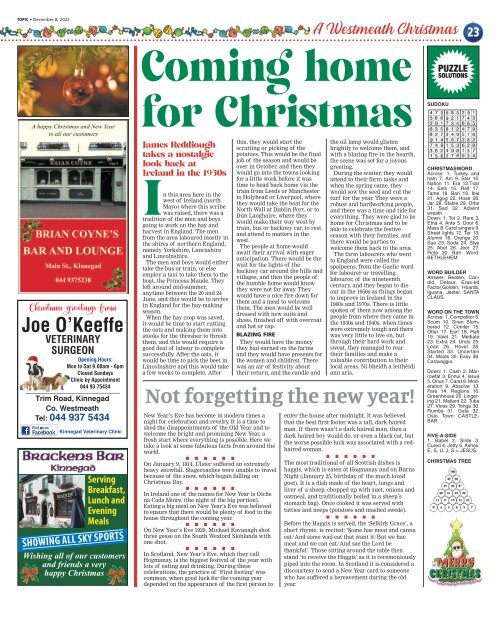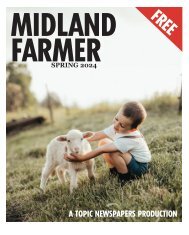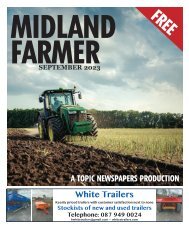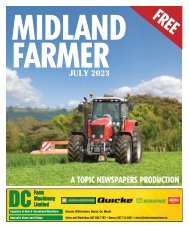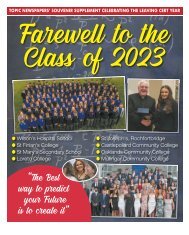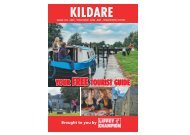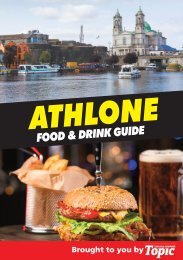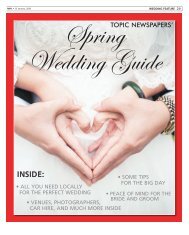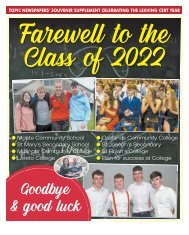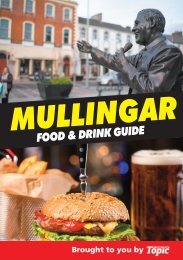A Westmeath Christmas (2022)
Create successful ePaper yourself
Turn your PDF publications into a flip-book with our unique Google optimized e-Paper software.
TOPIC • December 8, <strong>2022</strong><br />
A <strong>Westmeath</strong> <strong>Christmas</strong> 23<br />
Coming home<br />
PUZZLE<br />
SOLUTIONS<br />
for <strong>Christmas</strong><br />
SUDOKU<br />
<strong>Christmas</strong> greetings from<br />
Joe O’Keeffe<br />
VETERINARY<br />
SURGEON<br />
Opening Hours:<br />
Mon to Sat 9.00am - 6pm<br />
Closed Sundays<br />
Clinic by Appointment<br />
044 93 75434<br />
Trim Road, Kinnegad<br />
Co. <strong>Westmeath</strong><br />
Tel: 044 937 5434<br />
Kinnegad Veterinary Clinic<br />
Serving<br />
Breakfast,<br />
Lunch and<br />
Evening<br />
Meals<br />
SHOWING ALL SKY SPORTS<br />
Wishing all of our customers<br />
and friends a very<br />
happy <strong>Christmas</strong><br />
James Reddiough<br />
takes a nostalgic<br />
look-back at<br />
Ireland in the 1950s<br />
In this area here in the<br />
west of Ireland (north<br />
Mayo) where this scribe<br />
was raised, there was a<br />
tradition of the men and boys<br />
going to work on the hay and<br />
harvest in England. The men<br />
from the area laboured mostly in<br />
the shires of northern England,<br />
namely Yorkshire, Lancashire<br />
and Lincolnshire.<br />
The men and boys would either<br />
take the bus or train, or else<br />
employ a taxi to take them to the<br />
boat, the Princess Maude. They<br />
left around mid-summer,<br />
anytime between the 20 and 24<br />
June, and this would be to arrive<br />
in England for the hay-making<br />
season.<br />
When the hay crop was saved,<br />
it would be time to start cutting<br />
the oats and making them into<br />
stooks for the thresher to thresh<br />
them, and this would require a<br />
good deal of labour to complete<br />
successfully. After the oats, it<br />
would be time to pick the beet in<br />
Lincolnshire and this would take<br />
a few weeks to complete. After<br />
this, they would start the<br />
scratting or picking of the<br />
potatoes. This would be the final<br />
job of the season and would be<br />
over in October, and then they<br />
would go into the towns looking<br />
for a little work before it was<br />
time to head back home via the<br />
train from Leeds or Manchester<br />
to Holyhead or Liverpool, where<br />
they would take the boat for the<br />
North Wall at Dublin Port, or to<br />
Dún Laoghaire, where they<br />
would make their way west by<br />
train, bus or hackney car, to rest<br />
and attend to matters in the<br />
west.<br />
The people at home would<br />
await their arrival with eager<br />
anticipation. There would be the<br />
wait for the lights of the<br />
hackney car around the hills and<br />
villages, and then the people of<br />
the humble home would know<br />
they were not far away. They<br />
would have a nice fire down for<br />
them and a meal to welcome<br />
them. The men would be well<br />
dressed with new suits and<br />
shoes, finished off with overcoat<br />
and hat or cap.<br />
BLAZING FIRE<br />
They would have the money<br />
they had earned on the farms<br />
and they would have presents for<br />
the women and children. There<br />
was an air of festivity about<br />
their return, and the candle and<br />
the oil lamp would glisten<br />
brightly to welcome them, and<br />
with a blazing fire in the hearth,<br />
the scene was set for a joyous<br />
greeting.<br />
During the winter, they would<br />
attend to their farm tasks and<br />
when the spring came, they<br />
would sow the seed and cut the<br />
turf for the year. They were a<br />
robust and hardworking people,<br />
and there was a time and tide for<br />
everything. They were glad to be<br />
home for <strong>Christmas</strong> and to be<br />
able to celebrate the festive<br />
season with their families, and<br />
there would be parties to<br />
welcome them back to the area.<br />
The farm labourers who went<br />
to England were called the<br />
spalpeens, from the Gaelic word<br />
for labourer or travelling<br />
labourer, of the nineteenth<br />
century, and they began to die<br />
out in the 1950s as things began<br />
to improve in Ireland in the<br />
1960s and 1970s. There is little<br />
spoken of them now among the<br />
people from where they came in<br />
the 1930s and 1940s, when times<br />
were extremely tough and there<br />
was very little to live on, but<br />
through their hard work and<br />
sweat, they managed to rear<br />
their families and make a<br />
valuable contribution to their<br />
local areas. Ní bheidh a leithéidí<br />
ann arís.<br />
<br />
New Year’s Eve has become in modern times a<br />
night for celebration and revelry. It is a time to<br />
shed the disappointments of the Old Year and to<br />
welcome the bright and promising New Year, a<br />
fresh start where everything is possible. Here we<br />
take a look at some fabulous facts from around the<br />
world.<br />
■ ■ ■ ■ ■ ■<br />
On January 9, 1814, Ulster suffered an extremely<br />
heavy snowfall. Stagecoaches were unable to travel<br />
because of the snow, which began falling on<br />
<strong>Christmas</strong> Day.<br />
■ ■ ■ ■ ■ ■<br />
In Ireland one of the names for New Year is Oiche<br />
na Coda Moire, (the night of the big portion).<br />
Eating a big meal on New Year’s Eve was believed<br />
to ensure that there would be plenty of food in the<br />
house throughout the coming year.<br />
■ ■ ■ ■ ■ ■<br />
On New Year’s Eve 1929, Michael Kavanagh shot<br />
three geese on the South Wexford Sloblands with<br />
one shot.<br />
■ ■ ■ ■ ■ ■<br />
In Scotland, New Year’s Eve, which they call<br />
Hogmanay, is the biggest festival of the year with<br />
lots of eating and drinking. During these<br />
celebrations, the practice of ‘First footing’ was<br />
common, when good luck for the coming year<br />
depended on the appearance of the first person to<br />
enter the house after midnight. It was believed<br />
that the best first footer was a tall, dark-haired<br />
man. If there wasn’t a dark haired man, then a<br />
dark haired boy would do, or even a black cat, but<br />
the worse possible luck was associated with a redhaired<br />
woman.<br />
■ ■ ■ ■ ■ ■<br />
The most traditional of all Scottish dishes is<br />
haggis, which is eaten at Hogmanay and on Burns<br />
Night (January 25, birthday of the much loved<br />
poet). It is a dish made of the heart, lungs and<br />
liver of a sheep, chopped up with suet, onions and<br />
oatmeal, and traditionally boiled in a sheep’s<br />
stomach bag). Once cooked it was served with<br />
tatties and neeps (potatoes and mashed swede).<br />
■ ■ ■ ■ ■ ■<br />
Before the Haggis is served, the ‘Selkirk Grace’, a<br />
short rhyme, is recited; ‘Some hae meat and canna<br />
eat/And some wad eat that want it/But we hae<br />
meat and we can eat/And sae the Lord be<br />
thankful’. Those sitting around the table then<br />
stand ‘to receive the Haggis’ as it is ceremoniously<br />
piped into the room. In Scotland it is considered a<br />
discourtesy to send a New Year card to someone<br />
who has suffered a bereavement during the old<br />
year.<br />
CHRISTMASWORD<br />
Across: 1. Turkey and<br />
ham 7. Arc 9. Star 10.<br />
Nation 11. Era 12.Tsar<br />
14. Eels 15. Roll 17.<br />
Tame 18. Bari 19. Ibis<br />
21. Agog 22. Hose 26.<br />
Jar 28. Stable 29. Orbs<br />
31. Sad 32. Advent<br />
wreath.<br />
Down: 1. Tot 2. Rare 3.<br />
Etna 4. Ante 5. Door 6.<br />
Mass 8. Carol singers 9.<br />
Street lights 12. Tar 13.<br />
Alumni 16. Orange 20.<br />
Sue 23. Soda 24. Stye<br />
25. Abet 26. Jeer 27.<br />
Rota 30. Bah. Word:<br />
BETHLEHEM.<br />
WORD BUILDER<br />
Answer, Beaten, Candid,<br />
Detour, Eras-ed<br />
Factor,Golden, Hoards,<br />
Iguana, Jester. SANTA<br />
CLAUS.<br />
WORD ON THE TOWN<br />
Across: 1. Competitor 6.<br />
Scum 10. Siren Slumbered<br />
12. Conifer 15.<br />
Otter 17. Earl 18. Raft<br />
19. Valet 21. Mediate<br />
23. Extra 24. Undo 25.<br />
Lean 26. Hovel 28.<br />
Started 33. Uncertain<br />
34. Maids 35. Easy 36.<br />
Caravaggio.<br />
Down: 1. Cash 2. Marrowfat<br />
3. Ennui 4. Issue<br />
5. Onus 7. Carat 8. Moderation<br />
9. Absolve 13.<br />
Fare 14. Regions 16.<br />
Greenhouse 20. Lingering<br />
21. Mallard 22. Tuba<br />
27. Vices 29. Tonga 30.<br />
Rumba 31. Gala 32.<br />
Oslo. Town: CASTLE-<br />
BAR<br />
FIVE-A-SIDE<br />
1. Babel 2. Slide 3.<br />
Cured 4. Jetty 5. Ashes.<br />
E, S, U, J, S = JESUS.<br />
CHRISTMAS TREE


